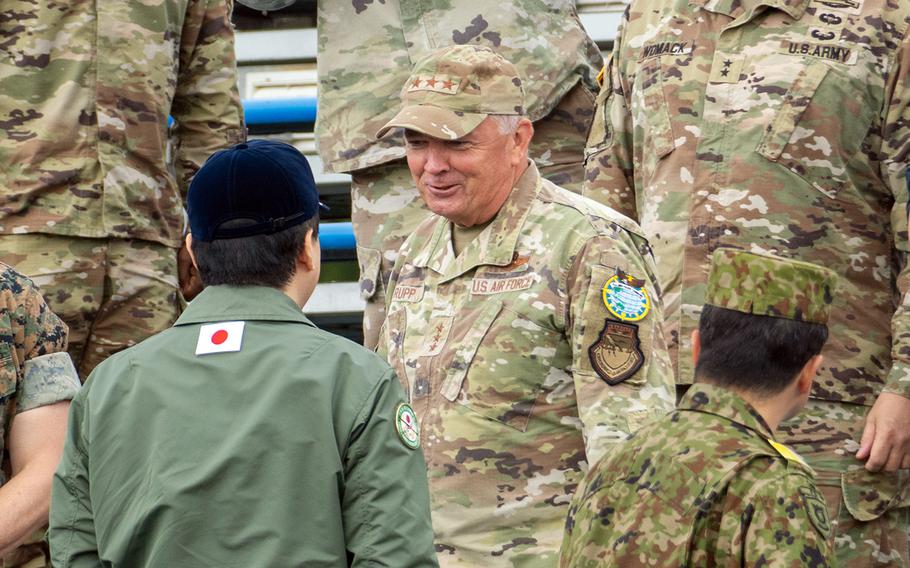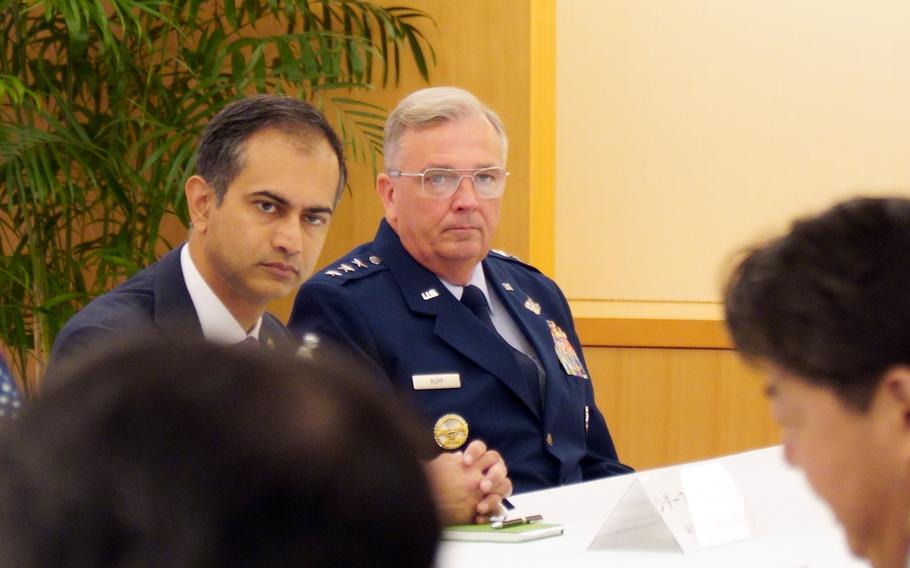
Air Force Lt. Gen. Ricky Rupp, commander of U.S. Forces Japan, speaks with Japanese Defense Minister Minoru Kihara during a live-fire exercise near Mount Fuji, May 27, 2024. (Akifumi Ishikawa/Stars and Stripes)
YOKOTA AIR BASE, Japan — Secretary of Defense Lloyd Austin is looking “very closely” at a proposal to put a four-star general in charge of U.S. Forces Japan.
The secretary told reporters about the plan Monday at the Shangri-La Dialogue defense forum in Singapore.
“This is something that we’re looking at very closely,” he said, according to a transcript of his remarks posted on the Defense Department website.
Austin said he had no announcement to make Monday about changes to USFJ. “We want to get it right the first time.”
“In terms of the command-and-control capability, we absolutely support Japan’s decision to stand up a joint headquarters,” he said in Singapore.

Air Force Lt. Gen. Ricky Rupp, commander of U.S. Forces Japan, visits the Ministry of Foreign Affairs in Tokyo, Jan. 6, 2023. (Akifumi Ishikawa/Stars and Stripes)
USFJ, headquartered at Yokota in western Tokyo, is led by Air Force Lt. Gen. Ricky Rupp, who is also in charge of 5th Air Force. The command serves as a liaison between the U.S. military throughout the country and the government of Japan.
“We are unable to speculate on any potential future decision points for our senior leaders,” a USFJ spokesman, Air Force Maj. Thomas Barger, said by email Tuesday. “USFJ leadership and staff continue to advance the U.S.-Japan Alliance amidst an increasingly severe security environment in the region.”
Upgrading the USFJ commander’s rank is symbolic but it’s unclear what the practical benefits are, said Ralph Cossa, a retired Air Force officer and former president of the Pacific Forum think tank in Hawaii.
“The most logical rationale would be to make USFJ and USFK (U.S. Forces Korea) commanders equivalents given the plan to upgrade the US-Japan [military-to-military] relationship,” he said by email Tuesday.
Combined Forces Command, which unifies USFK with the South Korean armed forces, is led by USFK commander Gen. Paul LaCamera, with a South Korean deputy commander. In a conflict, it would serve as the operational headquarters for all U.S. and South Korean forces.
A higher ranked commander makes no difference in terms of improved ability to fight and win a war, said Grant Newsham, a retired Marine colonel and senior researcher with the Japan Forum for Strategic Studies in Tokyo.
“What USFJ needs is the structure, resources, forces, command authority, and mission to be a real warfighting command - not a force that just apologizes to [the government of Japan] now and then when US forces misbehave and passes messages back and forth,” he said by email Tuesday. “Without the aforementioned, it really doesn’t matter if USFJ is a four-star or any other star.”
Plans to restructure USFJ were reported by The Financial Times in March. The aim is to boost military planning and drills involving the allies, according to the newspaper, which did not reveal its sources.
Japanese Chief Cabinet Secretary Yoshimasa Hayashi said at the time that discussions were underway about strengthening cooperation on command and control to improve the militaries’ readiness, training methods and ability to use each other’s equipment.
Japan might see a four-star U.S. general as more important and preferable since his Japanese counterpart might be the same rank, Newsham said.
“And if symbolism is what you’re after, a four star might suggest the US places more importance on Japan than symbolized by a three star,” he said. “But symbolism doesn’t win wars. And winning wars is all that matters.”